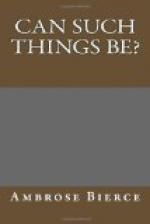II—STATEMENT OF CASPAR GRATTAN
To-day I am said to live; to-morrow, here in this room, will lie a senseless shape of clay that all too long was I. If anyone lift the cloth from the face of that unpleasant thing it will be in gratification of a mere morbid curiosity. Some, doubtless, will go further and inquire, “Who was he?” In this writing I supply the only answer that I am able to make—Caspar Grattan. Surely, that should be enough. The name has served my small need for more than twenty years of a life of unknown length. True, I gave it to myself, but lacking another I had the right. In this world one must have a name; it prevents confusion, even when it does not establish identity. Some, though, are known by numbers, which also seem inadequate distinctions.
One day, for illustration, I was passing along a street of a city, far from here, when I met two men in uniform, one of whom, half pausing and looking curiously into my face, said to his companion, “That man looks like 767.” Something in the number seemed familiar and horrible. Moved by an uncontrollable impulse, I sprang into a side street and ran until I fell exhausted in a country lane.
I have never forgotten that number, and always it comes to memory attended by gibbering obscenity, peals of joyless laughter, the clang of iron doors. So I say a name, even if self-bestowed, is better than a number. In the register of the potter’s field I shall soon have both. What wealth!
Of him who shall find this paper I must beg a little consideration. It is not the history of my life; the knowledge to write that is denied me. This is only a record of broken and apparently unrelated memories, some of them as distinct and sequent as brilliant beads upon a thread, others remote and strange, having the character of crimson dreams with interspaces blank and black—witch-fires glowing still and red in a great desolation.
Standing upon the shore of eternity, I turn for a last look landward over the course by which I came. There are twenty years of footprints fairly distinct, the impressions of bleeding feet. They lead through poverty and pain, devious and unsure, as of one staggering beneath a burden —
Remote, unfriended, melancholy, slow.
Ah, the poet’s prophecy of Me—how admirable, how dreadfully admirable!
Backward beyond the beginning of this via dolorosa—this epic of suffering with episodes of sin—I see nothing clearly; it comes out of a cloud. I know that it spans only twenty years, yet I am an old man.
One does not remember one’s birth—one has to be told. But with me it was different; life came to me full-handed and dowered me with all my faculties and powers. Of a previous existence I know no more than others, for all have stammering intimations that may be memories and may be dreams. I know only that my first consciousness was of maturity in body and mind—a consciousness accepted without surprise or conjecture. I merely found myself walking in a forest, half-clad, footsore, unutterably weary and hungry. Seeing a farmhouse, I approached and asked for food, which was given me by one who inquired my name. I did not know, yet knew that all had names. Greatly embarrassed, I retreated, and night coming on, lay down in the forest and slept.




